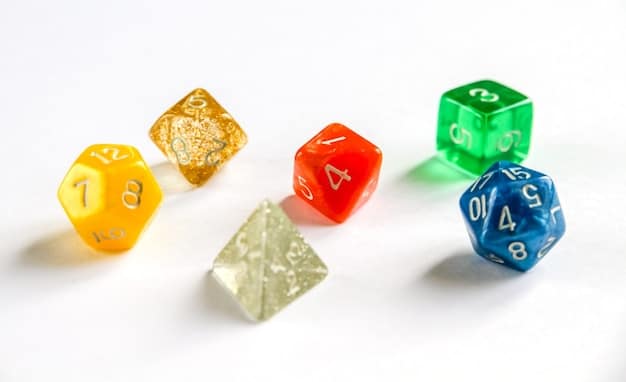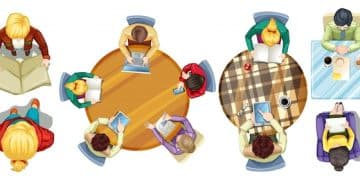Unveiling the Allure of Tabletop Role-Playing Games: A Geek’s Guide

Tabletop role-playing games (TTRPGs) offer immersive storytelling, strategic gameplay, and social interaction, making them a captivating hobby within the geek lifestyle for fostering creativity, problem-solving skills, and lasting friendships.
Are you looking for a hobby that combines storytelling, strategy, and social interaction? Look no further than tabletop role-playing games (TTRPGs). These immersive games offer a unique blend of creativity and collaboration, making them a perfect fit for the geek lifestyle.
What are Tabletop Role-Playing Games?
Tabletop role-playing games are more than just games; they’re collaborative storytelling experiences. Unlike video games or board games, TTRPGs rely heavily on imagination, improvisation, and social interaction.
At their core, TTRPGs involve a group of players who create and embody characters within a fictional world. A game master (GM) guides the story, acting as the narrator, referee, and architect of the game world.
The Basic Mechanics of TTRPGs
Understanding the mechanics is crucial before diving in. These games involve a few key elements that drive the narrative and character actions.
- Character Creation: Players design their characters, defining their abilities, skills, and backgrounds.
- Dice Rolling: Dice rolls determine the success or failure of actions, adding an element of chance and excitement.
- Storytelling: The GM weaves a narrative, presenting challenges and opportunities for the players to overcome.
- Role-Playing: Players immerse themselves in their characters, making decisions and interacting with the world as their characters would.
Ultimately, the beauty of TTRPGs lies in their flexibility. The rules provide a framework but are often modified or interpreted to fit the group’s preferences and the needs of the story.
In conclusion, tabletop role-playing games are collaborative storytelling experiences guided by a game master.
Why are TTRPGs Popular Within the Geek Community?
TTRPGs have found a natural home within the geek community, and for good reason. They offer a unique combination of elements that resonate deeply with geek culture.
The popularity of TTRPGs comes down to a variety of factors, mainly dealing with community and fantasy.
Escapism and World-Building
Many geeks are drawn to the escapism that TTRPGs provide. They offer a chance to step outside of reality and immerse themselves in fantastical worlds filled with adventure, magic, and intrigue.
- Create Unique Worlds: GMs can craft intricate and detailed worlds, complete with their own history, cultures, and mythologies.
- Explore Diverse Settings: TTRPGs cover a wide range of genres, from high fantasy to science fiction to horror, allowing players to explore different settings of interest.
- Develop Rich Narratives: Players can contribute to the world-building process, shaping the narrative and influencing the course of events.
TTRPGs give geeks a creative outlet, providing an opportunity to craft intricate characters, design compelling stories, and build imaginative worlds and narratives.

In essence, TTRPGs resonate profoundly with geeks by offering immersive experiences, creative outlets, and opportunities for social connection within welcoming communities.
The Benefits of Playing Tabletop RPGs
Beyond their entertainment value, TTRPGs offer a wide range of benefits that can positively impact players’ lives. These cognitive and social advantages contribute to personal growth and well-being.
From developing critical thinking skills to fostering teamwork and communication, TTRPGs offer a surprisingly comprehensive set of advantages.
Cognitive and Social Skills Development
TTRPGs challenge players to use their imaginations, think critically, and solve problems creatively. The collaborative nature of the games fosters teamwork, communication, and social skills.
- Enhance Problem-Solving Abilities: Players face unexpected challenges and must find creative solutions to overcome them.
- Improve Communication Skills: Players must effectively communicate with each other to coordinate actions and achieve shared goals.
- Foster Teamwork and Collaboration: Players work together as a team, relying on each other’s strengths and supporting each other’s weaknesses.
Playing TTRPGs enhances cognitive abilities like critical thinking and problem-solving, while also improving social skills such as communication and teamwork.
In summary, the benefits of playing tabletop RPGs extend beyond mere entertainment, fostering cognitive and social development for players of all ages and backgrounds.
Popular Tabletop RPG Systems for Beginners
If you’re new to the world of TTRPGs, it can be overwhelming to choose a system to start with. Fortunately, there are several systems designed specifically for beginners, offering simplified rules and welcoming communities.
When starting out, begin with beginner-friendly systems is recommended. This helps you grasp the basics before diving into more complex rule sets.
Dungeons & Dragons (D&D) 5th Edition
D&D 5th Edition is arguably the most popular TTRPG system in the world. It’s known for its relatively simple rules, accessible character creation, and vast amount of official content.
- Easy to Learn: D&D 5th Edition provides a streamlined rule set that is easy for beginners to grasp.
- Extensive Resources: Wizards of the Coast offers a wealth of official content. This includes rulebooks, adventure modules, and online resources.
- Large Community: D&D has a massive community of players and GMs, providing ample opportunities to find games and advice.
With its simple rules, Dungeons & Dragons opens up various resources where players and GMs can find ample opportunities to connect.

Ultimately, choosing the right TTRPG system depends on individual preferences and interests, but these beginner-friendly options offer a great starting point for anyone looking to explore the world of tabletop role-playing.
How to Find a Tabletop RPG Group
Finding a TTRPG group can seem daunting at first, but don’t worry! There are plenty of resources available to help you connect with like-minded players and GMs. Whether you’re looking for an in-person group or an online game, here are some tips to get you started.
Finding a group may seem difficult, but there are resources available to connect with players and GMs.
Online Platforms and Communities
The internet offers a wide range of platforms and communities dedicated to TTRPGs. These online spaces provide opportunities to connect with players from all over the world and find games that fit your interests and schedule.
- Roll20: Roll20 is a popular virtual tabletop platform that allows players to play TTRPGs online, complete with dice rolling, character sheets, and maps.
- Meetup.com: Meetup.com is a great platform for finding local TTRPG groups and events in your area.
- Discord Servers: Many TTRPG communities have Discord servers where players can chat, organize games, and share resources.
Online resources such as Roll20 and Meetup.com provide opportunities to find nearby or online groups to connect with.
The internet can assist in linking you to players around the world. Getting involved in a TTRPG group opens doors to friendship and shared experiences.
Tips for Being a Good Tabletop RPG Player
Being a good TTRPG player is about more than just knowing the rules or having a cool character. It’s about contributing to a collaborative and enjoyable experience for everyone at the table.
Contributing to a well-rounded group experience is essential when playing TTRPGs. Remember collaborative and thoughtful interactions will enhance the fun of the game.
Respect, Collaboration, and Engagement
Respect, collaboration, and engagement are essential for being a good TTRPG player.
- Be Respectful: Treat your fellow players and the GM with respect. Be mindful of their ideas and contributions.
- Collaborate: Work together with your fellow players to achieve shared goals. Avoid hogging the spotlight.
- Engage: Immerse yourself in the game world and actively participate in the story. Show enthusiasm and interest in what’s happening.
A good TTRPG player respects the other players and GM, and works towards engaging in the story and working towards goals.
So, whether you’re a seasoned veteran or a curious newcomer, embracing these tips will help you become a valued member of any TTRPG group and contribute to countless hours of unforgettable gaming experiences.
| Key Aspect | Brief Description |
|---|---|
| 🎲 Core Mechanics | Character creation, dice rolling, storytelling and role-playing. |
| 🌐 Escapism & World-Building | Players create unique worlds with rich narratives. |
| 🧠 Benefits | Enhances problem-solving abilities & communicative skills. |
| 🤝 Group Dynamics | Respect, collaboration, & engagement are key. |
FAQ
▼
A tabletop role-playing game is a form of interactive storytelling. Players create characters and embark on adventures guided by a game master, using dice and their imaginations to shape the story.
▼
TTRPGs offer escapism, creative freedom, and a strong sense of community, which resonates with geek culture’s love for fantasy, imagination, and camaraderie.
▼
Playing TTRPGs can improve your problem-solving skills, communication, teamwork, and creativity. It’s also a great way to connect with others who share your interests.
▼
You can find TTRPG groups online through platforms like Roll20, Meetup, and Discord. Local game stores and community centers often host in-person games as well.
▼
A good TTRPG player is respectful, collaborative, and fully engaged in the game. Be mindful of other players’ ideas, work as a team, and immerse yourself in the story.
Conclusion
In conclusion, tabletop role-playing games provide a rich and rewarding experience for individuals seeking creativity, social interaction, and strategic thinking. With numerous systems and vibrant communities, the world of TTRPGs offers something for every geek looking to embark on an unforgettable adventure.





